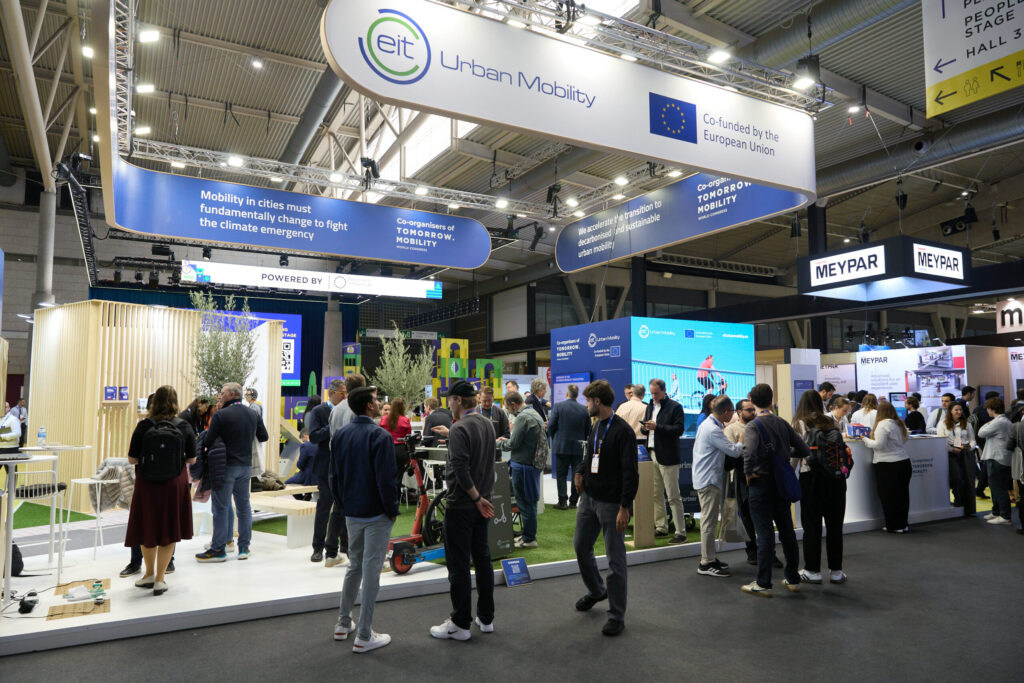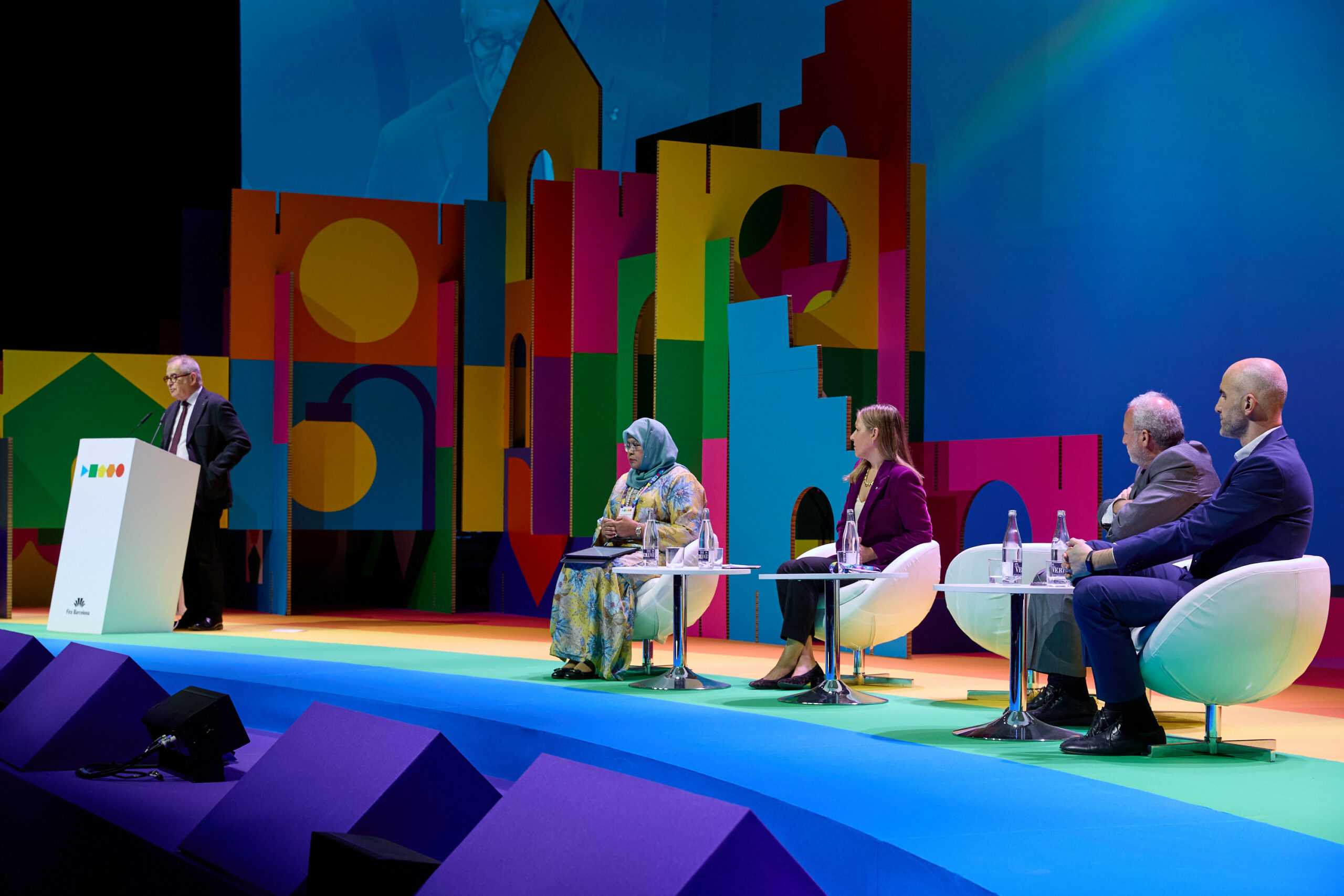For its fifth year, Barcelona became the meeting point for the world’s leading mobility innovators, researchers and policymakers as the Tomorrow.Mobility World Congress (TMWC) returned to Fira Barcelona from 4-6 November. Co-organised by Fira Barcelona and EIT Urban Mobility, the event ran alongside the Smart City Expo World Congress, welcoming over 27,000 attendees from more than 140 countries for three days of knowledge sharing, dialogue and exploration.
This year’s central message resonated clearly across plenaries and panel discussions alike: while technology becomes more and more advanced, the future of urban mobility must be human-centric. As Dr. Maimunah binti Mohd Sharif the Mayor of Kuala Lumpur, Malaysia explained in the congress’s opening remarks, “we need to transform from a liveable city to a loveable city.”
Technology in service of people
The call for human-centric cities is not a rejection of technology, but a reminder of its purpose. Over the course of more than 350 Smart City sessions featuring over 590 speakers, participants explored how harnessing the power of data, digital innovation and automation can enhance urban liveability.
Speakers throughout the congress emphasised that creating people-first mobility and public space is not just about deploying new technologies, but rather it is about understanding the people who use them. As Jan Luca Kästle, researcher at University College London explained in the panel discussion Better data for more sustainable mobility systems, “For us, data is at the core of everything. We need it to understand human behaviour and then use it to gain insights on how to design mobility systems better.”
This perspective guided many of the discussions across TMWC 2025, bridging the gap between new technologies and data, and pointing to new ways to influence positive mobility habits through design, communication and incentives.
Understanding behaviour: the power of the nudge
A recurring theme throughout the congress was how to balance raw data with the need to understand mobility and public space users. Thus, the content capsule, Beyond the car: when green commuting is the smart choice, focused on behavioural insights and change explored how subtle behavioural cues can shift mobility habits — from encouraging active travel to promoting the use of shared mobility services.
As Michael Semmer, Co-Founder of Urban Places Lab mentioned in the session Breaking habits, building mobility hubs people use,“You need to understand why people have the habits they do before you can try to change them. For example, driving a car gives us the illusion of having control…even if it is the more expensive option or if there is congestion, it still gives the illusion of control. So, once you know that you can go about trying to change that behaviour.”
In the session Using Psychological factors to incentivise modal shift, Nudgd Chief Technology Officer and Co-Founder, Ola Rynge, explained the necessity of the human touch, stating “we need to measure attitudes and awareness before we can even begin to go into behavioural change.” Underscoring the importance of empathy in mobility design, the panelists agree that a human-centric approach begins by observing how people actually move, not how planners assume they do.
Lukas Neckermann, Managing Director of Neckermann Strategic Advisors added that context is key, in that what may feel like a nudge to one mobility user, could be a ‘hammer’ to another. Thus, analysing behaviour and context is paramount when making sustainable options the easiest and most appealing ones.
From behaviour to data: seeing the whole picture
Understanding human behaviour requires insights, and insights depend on data. A throughline of many sessions was how mobility data can help cities make more informed, evidence-based decisions to improve accessibility, efficiency and safety. But as several speakers and panellists noted, collecting, storing and using data responsibly is still a challenge.
In the session From Paper to Predictive: How AI and IoT Are Rewiring Bus Operations, Carles Sanz, Chief Information Officer for transport operator Moventia, explained the necessity of secure data spaces in order for raw data to be useful and transferrable. To achieve multimodal integration he explained, “you need to bring together, in collaboration, all operators and public authorities…then a data space can be created, giving the opportunity to the final customer to plan their journeys effectively.”

As the role of data in urban mobility expands, so too does the need for trust. Participants repeatedly stressed that responsible data use must be built on a foundation of transparency, security and citizen confidence.
Maria Galindo Garcia-Delgado, Secretary of Digital Policies for the Generalitat de Catalunya, reminded attendees that “tech today is far more than a tool, it is power, it is influence and above all, it is responsibility.” She called for “promoting tech that is ethical, transparent and designed to support people,” ensuring that no one is left behind in the digital society.
Barcelona’s Deputy Mayor, Jordi Valls, echoed this sentiment, asking, “What truly makes a city smart?” positing that it is one “which helps us improve the wellbeing and life of citizens, today and for future citizens.” He cautioned that “technology without social values can become a nightmare,” calling for “a human and humanistic technological revolution.”
From a European perspective, Belit Onay, Mayor of Hannover, stressed the need for alignment and collaboration, explaining “cooperation both nationally and internationally is the key to success for smart cities…only when cities have control over their own data and infrastructure can they break new ground without breaking people’s trust.”
Aligned with the desire for trust building was the way that cities communicate to citizens about data use. In the session Solving urban logistics challenges thanks to public-private collaboration Paola Cossu, Board Member of ALICE (Alliance for Logistics Innovation through Collaboration in Europe) and CEO at FIT Consulting expressed that cities must change the narrative from ‘data sharing’ to ‘data exchange’ emphasising collaboration and the benefits that users receive from the deployment of their data.
Human-centric innovation: collaboration as the common thread
As cities worldwide race to decarbonise transport systems and adapt to rapid technological change, who we design mobility for must remain front and centre. Throughout TMWC 2025, this sentiment echoed across sessions, from discussions on AI and autonomous mobility to those on microhubs, logistics, and cycling.
Speakers repeatedly returned to one message: deploying technology must be done in the service of creating more liveable and enjoyable cities. Barcelona’s Deputy Mayor Jordi Valls reinforced this message, stating “We must work collectively to ensure that emerging tech is placed to value human needs and life.”
By placing people, rather than technology, at the heart of mobility innovation, cities can foster connection, belonging and joy in urban life – creating not only liveable but loveable cities.
Looking ahead
Mark your calendars, Tomorrow.Mobility World Congress will return to Barcelona from 3-5 November 2026.
